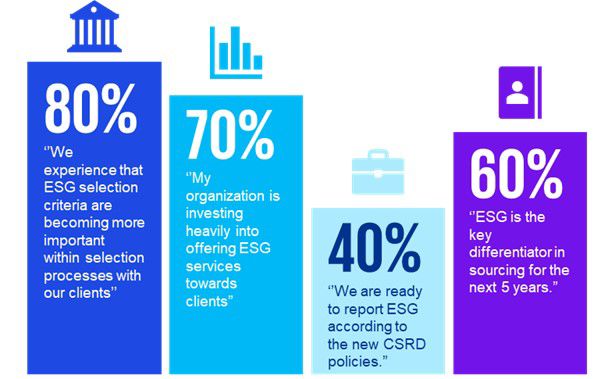Environmental, social and governance (ESG) factors are aspects of a company's non-financial performance that relate to its environmental impact, social responsibility and sound corporate governance. ESG is increasingly being embedded in organizational strategy. Due to the Corporate Sustainability Reporting Directive (CSRD), consistent and comprehensive sustainability reporting is mandatory for around 50,000 companies based in – or operating in – the EU. As organizations are often hugely reliant on external suppliers, the impact ESG and CSRD will have on (out)sourcing is also increasing.
ESG compliance and collaboration with third parties
ESG goes beyond annual non-financial reporting requirements, with stakeholders demanding from organizations to transparently discuss, monitor and steer on their ESG strategy, impacts and accountability efforts.
CSRD reporting requirements are changing the way that organizations collaborate with their suppliers. The CSRD expands the scope of reporting and requires more detailed information to be disclosed. It also introduces new reporting requirements on the impact of organizations' activities in their supply chains. This ensures that the supplier does not comply by simply ‘ticking the box’ on, for example, the aspect 'Compliance with the Client’s Code of Conduct'. Suppliers need to be flexible in adapting to different client reporting requirements, in order to comply with their clients’ ESG regulations and to global changes, particularly those driven by European guidelines.
Insights from 25 unique service providers
The annual Service Provider Forum hosted by KPMG focused on the growing importance of ESG considerations in outsourcing.
During the event, 50 participants – representing 25 unique suppliers – engaged in voting and discussions on critical statements related to ESG. Regulatory guidance was identified as the most influential aspect impacting ESG in the sourcing process. The majority recognized ESG as the key differentiator in sourcing for the next 5 years, since it stimulates companies to align with evolving consumer preferences, comply with regulations, mitigate risks, attract investors and build long-term resilience. However, the degree of readiness to report ESG in accordance with new policies varied among respondents.

Expected impact areas for (out)sourcing. The client perspective
- More focus on the selection of ESG minded and transparent suppliers: clients are increasingly looking for suppliers that have a strong ESG performance, as well as for suppliers that are transparent about their ESG performance and reporting and are willing to share ESG data. This emerges from clients seeing strong ESG as their licence to operate.
- More focus on suppliers that can improve your ESG related reporting (in terms of structure and figures): clients are looking for suppliers that have the expertise and experience to help them collect and analyze ESG data, enabling them to facilitate integrated reporting. In addition, they are in search of suppliers that can help them communicate their ESG performance to their stakeholders.
- More focus on suppliers that are willing to work together to make the world a better place: clients are actively seeking suppliers that are committed to sustainability (e.g. minimization of environmental impact), social responsibility (e.g. fair wages), and governance (e.g. transparency). Furthermore, clients are keen on collaborating with suppliers that are willing to share their knowledge and expertise with others.
- Dealing with existing supplier contracts: clients are faced with the challenge of how to deal with existing contracts with suppliers that are not ESG minded. They can either terminate the contracts and find new suppliers, or they can work with the existing suppliers to improve their ESG performance. The best approach will depend on the specific situation.
ESG selection criteria as a trend for (out)sourcing
KPMG sees an emerging trend in sourcing engagements where organizations are increasingly demanding selection criteria, robust risk management, and ongoing monitoring and control related to ESG elements, especially in relation to the supply chain (e.g. gas emissions and waste production). With the CSRD reporting gaining momentum, KPMG expects that more organizations will consider ESG as a major factor in supplier selection. Clients are expected to increasingly select suppliers based on their own ESG objectives.
Previously, ESG related reporting was largely focused on individual organizations. This included environmental performance indicators such as Green IT and carbon footprint reduction, as well as social indicators, such as diversity and social return. Both clients and suppliers would report independently. However, the implementation of CSRD will require a more holistic reporting, which implies that increased cooperation between clients and suppliers is required in order to report on these topics. Moreover clients have to report on their ESG goals, which include KPI information (e.g. energy consumption, carbon dioxide emissions, diversity, corporate governance) of (outsourced) services that need to be provided by its suppliers (see also European Sustainability Reporting Standards ESRS1, ESRS2).

Key Next Steps
ESG considerations are increasingly shaping sourcing operations and client relationships. Organizations are advised to align their strategies, policies, and practices with ESG principles to meet stakeholder expectations and seize emerging opportunities. By embracing ESG, suppliers can better serve their clients and contribute to a sustainable future. KPMG is an experienced and proven change partner for transformational projects globally. KPMG can support both client and supplier organizations to implement ESG in a way that is effective and efficient, by providing guidance and expertise on ESG matters (ESG & Sustainability services).
Discover more

We will keep you informed by email.
Enter your preferences here.



